- Home
- Friedrich Nietzsche
Aphorisms on Love and Hate Page 4
Aphorisms on Love and Hate Read online
Page 4
*
Who suffers more? After a personal disagreement and quarrel between a woman and a man, the one party suffers most at the thought of having hurt the other; while that other party suffers most at the thought of not having hurt the first enough; for which reason it tries by tears, sobs, and contorted features, to weigh down the other person’s heart, even afterwards.
*
Opportunity for female generosity. Once a man’s thoughts have gone beyond the demands of custom, he might consider whether nature and reason do not dictate that he marry several times in succession, so that first, aged twenty-two years, he marry an older girl who is spiritually and morally superior to him and can guide him through the dangers of his twenties (ambition, hatred, self-contempt, passions of all kinds). This woman’s love would later be completely transformed into maternal feeling, and she would not only tolerate it, but promote it in the most salutary way, if the man in his thirties made an alliance with a quite young girl, whose education he himself would take in hand.
For one’s twenties, marriage is a necessary institution; for one’s thirties, it is useful, but not necessary; for later life, it often becomes harmful and promotes a husband’s spiritual regression.
*
Tragedy of childhood. Not infrequently, noble-minded and ambitious men have to endure their harshest struggle in childhood, perhaps by having to assert their characters against a low-minded father, who is devoted to pretense and mendacity, or by living, like Lord Byron, in continual struggle with a childish and wrathful mother. If one has experienced such struggles, for the rest of his life he will never get over knowing who has been in reality his greatest and most dangerous enemy.
*
From the future of marriage. Those noble, free-minded women who set themselves the task of educating and elevating the female sex should not overlook one factor: marriage, conceived of in its higher interpretation, the spiritual friendship of two people of opposite sexes, that is, marriage as hoped for by the future, entered into for the purpose of begetting and raising a new generation. Such a marriage, which uses sensuality as if it were only a rare, occasional means for a higher end, probably requires and must be provided with a natural aid: concubinage. For if, for reasons of the man’s health, his wife is also to serve for the sole satisfaction of his sexual need, a false point of view, counter to the goals we have indicated, will be decisive in choosing a wife. Posterity becomes a coincidental objective; its successful education, highly improbable. A good wife, who should be friend, helpmate, child-bearer, mother, head of the family, manager, indeed, who perhaps has to run her own business or office separate from her husband, cannot be a concubine at the same time: it would usually be asking too much of her. Thus, the opposite of what happened in Pericles’ times in Athens could occur in the future: men, whose wives were not much more than concubines then, turned to Aspasias as well, because they desired the delights of a mentally and emotionally liberating sociability, which only the grace and spiritual flexibility of women can provide. All human institutions, like marriage, permit only a moderate degree of practical idealization, failing which, crude measures immediately become necessary.
*
Happiness of marriage. Everything habitual draws an ever tighter net of spiderwebs around us; then we notice that the fibres have become traps, and that we ourselves are sitting in the middle, like a spider that got caught there and must feed on its own blood. That is why the free spirit hates all habits and rules, everything enduring and definitive; that is why, again and again, he painfully tears apart the net around him, even though he will suffer as a consequence from countless large and small wounds – for he must tear those fibres away from himself, from his body, his soul. He must learn to love where he used to hate, and vice versa. Indeed, nothing may be impossible for him, not even to sow dragons’ teeth on the same field where he previously emptied the cornucopias of his kindness.
From this one can judge whether he is cut out for the happiness of marriage.
*
Too close. If we live in too close proximity to a person, it is as if we kept touching a good etching with our bare fingers; one day we have poor, dirty paper in our hands and nothing more. A human being’s soul is likewise worn down by continual touching; at least it finally appears that way to us – we never see its original design and beauty again.
One always loses by all-too-intimate association with women and friends; and sometimes one loses the pearl of his life in the process.
*
Voluntary sacrificial animal. Significant women bring relief to the lives of their husbands, if the latter are famous and great, by nothing so much as by becoming a vessel, so to speak, for other people’s general ill-will and occasional bad humor. Contemporaries tend to overlook their great men’s many mistakes and follies, even gross injustices, if only they can find someone whom they may abuse and slaughter as a veritable sacrificial animal to relieve their feelings. Not infrequently a woman finds in herself the ambition to offer herself for this sacrifice, and then the man can of course be very contented – in the case that he is egoist enough to tolerate in his vicinity such a voluntary conductor of lightning, storm, and rain.
*
Ceterum censeo.* It is ludicrous when a have-not society declares the abolition of inheritance rights, and no less ludicrous when childless people work on the practical laws of a country: they do not have enough ballast in their ship to be able to sail surely into the ocean of the future. But it seems just as nonsensical if a man who has chosen as his task the acquisition of the most general knowledge and the evaluation of the whole of existence weighs himself down with personal considerations of a family, a livelihood, security, respect of his wife and child; he is spreading out over his telescope a thick veil, which scarcely any rays from the distant heavens are able to penetrate. So I, too, come to the tenet that in questions of the highest philosophical kind, all married people are suspect.
*
Passion for things. He who directs his passion to things (the sciences, the national good, cultural interests, the arts) takes much of the fire out of his passion for people (even when they represent those things, as statesmen, philosophers, and artists represent their creations).
*
The right profession. Men seldom endure a profession if they do not believe or persuade themselves that it is basically more important than all others. Women do the same with their lovers.
*
Friend. Shared joy, not compassion, makes a friend.
*
More troublesome than enemies. When some reason (e.g., gratitude) obliges us to maintain the appearance of unqualified congeniality with people about whose own congenial behavior we are not entirely convinced, these people torment our imagination much more than do our enemies.
*
Wanting to be loved. The demand to be loved is the greatest kind of arrogance.
*
Contempt for people. The least ambiguous sign of a disdain for people is this: that one tolerates everyone else only as a means to his end, or not at all.
*
The life of the enemy. Whoever lives for the sake of combating an enemy has an interest in the enemy’s staying alive.
*
Want of friends. A want of friends points to envy or arrogance. Many a man owes his friends simply to the fortunate circumstance that he has no cause for envy.
*
Love and hatred. Love and hatred are not blind, but are blinded by the fire they themselves carry with them.
*
Punctum saliens* of passion. He who is about to fall into a state of anger or violent love reaches a point where his soul is full like a vessel; but it needs one more drop of water: the good will to passion (which is generally also called the bad will). Only this little point is necessary; then the vessel runs over.
*
The hour-hand of life. Life consists of rare, isolated moments of the greatest significance, and of innumerably many intervals, during w
hich at best the silhouettes of those moments hover about us. Love, springtime, every beautiful melody, mountains, the moon, the sea – all these speak completely to the heart but once, if in fact they ever do get a chance to speak completely. For many men do not have those moments at all, and are themselves intervals and intermissions in the symphony of real life.
*
Learning to love. We must learn to love, learn to be kind, and this from earliest youth; if education or chance give us no opportunity to practice these feelings, our soul becomes dry and unsuited even to understanding the tender inventions of loving people. Likewise, hatred must be learned and nurtured, if one wishes to become a proficient hater: otherwise the germ for that, too, will gradually wither.
*
Love and respect. Love desires; fear avoids. That is why it is impossible, at least in the same time span, to be loved and respected by the same person. For the man who respects another, acknowledges his power; that is, he fears it: his condition is one of awe. But love acknowledges no power, nothing that separates, differentiates, ranks higher or subordinates. Because the state of being loved carries with it no respect, ambitious men secretly or openly balk against it.
*
Love as a device. Whoever wants really to get to know something new (be it a person, an event, or a book) does well to take up this new thing with all possible love, to avert his eye quickly from, even to forget, everything about it that he finds inimical, objectionable, or false. So, for example, we give the author of a book the greatest possible head start, and, as if at a race, virtually yearn with a pounding heart for him to reach his goal. By doing this, we penetrate into the heart of the new thing, into its motive centre: and this is what it means to get to know it. Once we have got that far, reason then sets its limits; that overestimation, that occasional unhinging of the critical pendulum, was just a device to entice the soul of a matter out into the open.
*
Seriousness in play. At sunset in Genoa, I heard from a tower a long chiming of bells: it kept on and on, and over the noise of the backstreets, as if insatiable for itself, it rang out into the evening sky and the sea air, so terrible and so childish at the same time, so melancholy. Then I thought of Plato’s words and felt them suddenly in my heart: all in all, nothing human is worth taking very seriously; nevertheless …
BOCCACCIO · Mrs Rosie and the Priest
GERARD MANLEY HOPKINS · As kingfishers catch fire
The Saga of Gunnlaug Serpent-tongue
THOMAS DE QUINCEY · On Murder Considered as One of the Fine Arts
FRIEDRICH NIETZSCHE · Aphorisms on Love and Hate
JOHN RUSKIN · Traffic
PU SONGLING · Wailing Ghosts
JONATHAN SWIFT · A Modest Proposal
Three Tang Dynasty Poets
WALT WHITMAN · On the Beach at Night Alone
KENKŌ · A Cup of Sake Beneath the Cherry Trees
BALTASAR GRACIÁN · How to Use Your Enemies
JOHN KEATS · The Eve of St Agnes
THOMAS HARDY · Woman much missed
GUY DE MAUPASSANT · Femme Fatale
MARCO POLO · Travels in the Land of Serpents and Pearls
SUETONIUS · Caligula
APOLLONIUS OF RHODES · Jason and Medea
ROBERT LOUIS STEVENSON · Olalla
KARL MARX AND FRIEDRICH ENGELS · The Communist Manifesto
PETRONIUS · Trimalchio’s Feast
JOHANN PETER HEBEL · How a Ghastly Story Was Brought to Light by a Common or Garden Butcher’s Dog
HANS CHRISTIAN ANDERSEN · The Tinder Box
RUDYARD KIPLING · The Gate of the Hundred Sorrows
DANTE · Circles of Hell
HENRY MAYHEW · Of Street Piemen
HAFEZ · The nightingales are drunk
GEOFFREY CHAUCER · The Wife of Bath
MICHEL DE MONTAIGNE · How We Weep and Laugh at the Same Thing
THOMAS NASHE · The Terrors of the Night
EDGAR ALLAN POE · The Tell-Tale Heart
MARY KINGSLEY · A Hippo Banquet
JANE AUSTEN · The Beautifull Cassandra
ANTON CHEKHOV · Gooseberries
SAMUEL TAYLOR COLERIDGE · Well, they are gone, and here must I remain
JOHANN WOLFGANG VON GOETHE · Sketchy, Doubtful, Incomplete Jottings
CHARLES DICKENS · The Great Winglebury Duel
HERMAN MELVILLE · The Maldive Shark
ELIZABETH GASKELL · The Old Nurse’s Story
NIKOLAY LESKOV · The Steel Flea
HONORÉ DE BALZAC · The Atheist’s Mass
CHARLOTTE PERKINS GILMAN · The Yellow Wall-Paper
C.P. CAVAFY · Remember, Body …
FYODOR DOSTOEVSKY · The Meek One
GUSTAVE FLAUBERT · A Simple Heart
NIKOLAI GOGOL · The Nose
SAMUEL PEPYS · The Great Fire of London
EDITH WHARTON · The Reckoning
HENRY JAMES · The Figure in the Carpet
WILFRED OWEN · Anthem For Doomed Youth
WOLFGANG AMADEUS MOZART · My Dearest Father
PLATO · Socrates’ Defence
CHRISTINA ROSSETTI · Goblin Market
Sindbad the Sailor
SOPHOCLES · Antigone
RYŪNOSUKE AKUTAGAWA · The Life of a Stupid Man
LEO TOLSTOY · How Much Land Does A Man Need?
GIORGIO VASARI · Leonardo da Vinci
OSCAR WILDE · Lord Arthur Savile’s Crime
SHEN FU · The Old Man of the Moon
AESOP · The Dolphins, the Whales and the Gudgeon
MATSUO BASHŌ · Lips too Chilled
EMILY BRONTË · The Night is Darkening Round Me
JOSEPH CONRAD · To-morrow
RICHARD HAKLUYT · The Voyage of Sir Francis Drake Around the Whole Globe
KATE CHOPIN · A Pair of Silk Stockings
CHARLES DARWIN · It was snowing butterflies
BROTHERS GRIMM · The Robber Bridegroom
CATULLUS · I Hate and I Love
HOMER · Circe and the Cyclops
D. H. LAWRENCE · Il Duro
KATHERINE MANSFIELD · Miss Brill
OVID · The Fall of Icarus
SAPPHO · Come Close
IVAN TURGENEV · Kasyan from the Beautiful Lands
VIRGIL · O Cruel Alexis
H. G. WELLS · A Slip under the Microscope
HERODOTUS · The Madness of Cambyses
Speaking of Siva
The Dhammapada
LITTLEBLACKCLASSICS.COM
THE BEGINNING
Let the conversation begin...
Follow the Penguin Twitter.com@penguinukbooks
Keep up-to-date with all our stories YouTube.com/penguinbooks
Pin ‘Penguin Books’ to your Pinterest
Like ‘Penguin Books’ on Facebook.com/penguinbooks
Listen to Penguin at SoundCloud.com/penguin-books
Find out more about the author and
discover more stories like this at Penguin.co.uk
PENGUIN CLASSICS
Published by the Penguin Group
Penguin Books Ltd, 80 Strand, London WC2R 0RL, England
Penguin Group (USA) Inc., 375 Hudson Street, New York, New York 10014, USA
Penguin Group (Canada), 90 Eglinton Avenue East, Suite 700, Toronto, Ontario, Canada M4P 2Y3 (a division of Pearson Penguin Canada Inc.)
Penguin Ireland, 25 St Stephen’s Green, Dublin 2, Ireland (a division of Penguin Books Ltd)
Penguin Group (Australia), 707 Collins Street, Melbourne, Victoria 3008, Australia (a division of Pearson Australia Group Pty Ltd)
Penguin Books India Pvt Ltd, 11 Community Centre, Panchsheel Park, New Delhi – 110 017, India
Penguin Group (NZ), 67 Apollo Drive, Rosedale, Auckland 0632, New Zealand (a division of Pearson New Zealand Ltd)
Penguin Books (South Africa) (Pty) Ltd, Block D, Rosebank Office Park, 181 Jan Smuts Avenue, Parktown North, Gauteng 2193, South Africa
Penguin Books
Ltd, Registered Offices: 80 Strand, London WC2R 0RL, England
www.penguin.com
This selection published in Penguin Classics 2015
Translation copyright © Marion Faber, 1984
The moral right of the translator has been asserted
All rights reserved
ISBN: 978-0-141-39791-7
* ‘That which men call virtue is usually no more than a phantom formed by our passions, to which one gives an honest name in order to do with impunity whatever one wishes.’
* ‘Know that nothing is more common than to do harm for the pleasure of doing it.’
* Censor vitae: critic of life.
* ‘Incidentally, I am of the opinion.’
* the salient point
Friedrich Nietzsche, Aphorisms on Love and Hate
(Series: # )
Thank you for reading books on Archive.BookFrom.Net
Share this book with friends

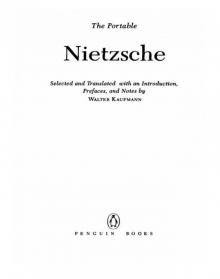 The Portable Nietzsche
The Portable Nietzsche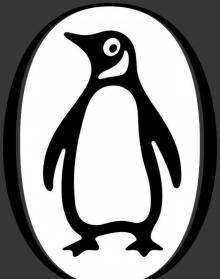 Twilight of the Idols/The Anti-Christ
Twilight of the Idols/The Anti-Christ Thus Spoke Zarathustra
Thus Spoke Zarathustra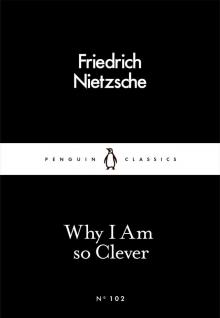 Why I Am So Clever
Why I Am So Clever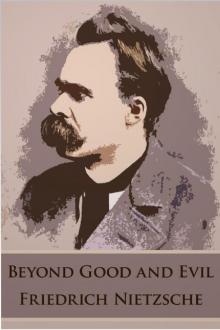 Beyond Good and Evil
Beyond Good and Evil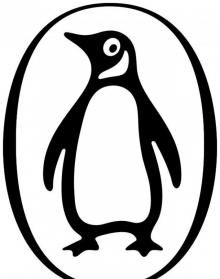 Twilight of Idols and Anti-Christ
Twilight of Idols and Anti-Christ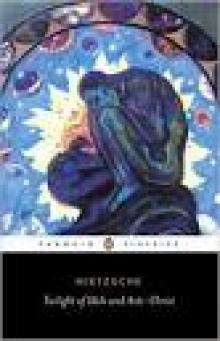 Twilight of Idols and Anti-Christ (Penguin Classics)
Twilight of Idols and Anti-Christ (Penguin Classics)